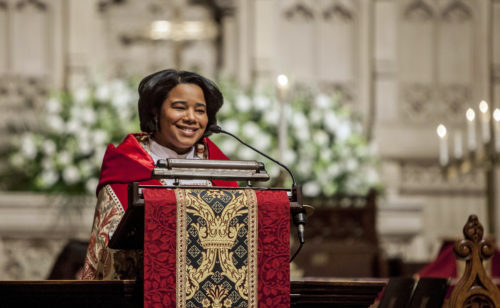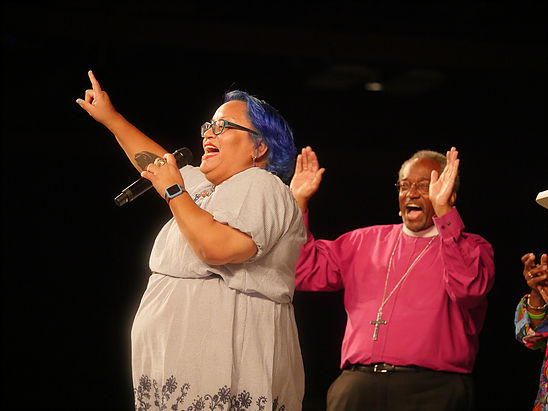Episcopal Latinas continue to celebrate ‘firsts’ as Hispanic/Latino Ministries turns 50Posted Dec 7, 2020 |
|
[Episcopal News Service] If the Rev. Nancy Frausto’s mother hadn’t mistakenly parked her car outside a Southern California Episcopal church when it came time to plan her daughter’s first Communion, she may never have become a priest.

The Rev. Bavi Edna “Nedi” Rivera became the first Latina bishop when she was consecrated as bishop suffragan in the Diocese of Olympia in January 2005.
When Frausto’s parents immigrated to the United States from Mexico, bringing a 7-year-old Nancy and her two siblings, it took the family a couple of years to adjust and settle into their new life in Los Angeles. When Frausto was 10 or 11 and it was time for her to receive the Eucharist, her mother looked for a Roman Catholic parish.
Following a neighbor’s directions, her mother passed a sign advertising a Spanish-language Mass and drove into the parking lot of All Saints’ Episcopal Church in the city’s historic Highland Park neighborhood. Despite the priest clarifying that All Saints’ wasn’t a Roman Catholic church, Frausto’s mother stayed.
Frausto’s accidental initiation into The Episcopal Church, her love of its liturgy and Christian formation and the support she received from All Saints’ as an undergraduate, when she realized she was undocumented, all helped lead her in 2012 to become the first Latina ordained in the Diocese of Los Angeles to have been sponsored by a Spanish-language congregation.
“As immigrants in this country, finding the church and seeing how they welcomed and totally embraced us … we found our family in the church,” said Frausto, who now serves as associate rector at St. Luke’s Episcopal Church in Long Beach, California, and as a consultant in The Episcopal Church’s Evangelism Office. “If it hadn’t been for the church, I don’t know where I’d be. They were so supportive in my calling to serve.”

The Rev. Nancy Frausto, a “Dreamer” and deputy from the Diocese of Los Angeles, testifies July 7, 2018, at the joint hearing on immigration resolutions during the 79th General Convention. Photo: David Paulsen/Episcopal News Service
Still, Frausto and other Latinas interviewed for this story on women’s leadership agreed that The Episcopal Church could do more to foster and model leadership for Hispanic women.
“We definitely need to see more Latinas in ministry as ordained and lay leaders,” Frausto said.
2020 marks 50 years of Latino/Hispanic Ministries in The Episcopal Church; it was also in 1970 that the first women were seated in the House of Deputies, formalizing their participation in General Convention, the church’s triennial governing body. It took another six years and the trailblazing ordination of 11 women in 1974 in Philadelphia before General Convention approved women’s ordination in 1976.
Also in 1976, the Rt. Rev. Bavi Edna “Nedi” Rivera became the first ordained woman of Latin American descent; 29 years later, she became the first Latina bishop when she was ordained bishop suffragan of the Diocese of Olympia in 2005. It took another decade before the Very Rev. Miguelina Howell became the first Latina cathedral dean. This year, on Oct. 10, the Rev. Yesenia “Jessie” Alejandro also became “the first” when she was ordained a priest in the Episcopal Diocese of Pennsylvania. Alejandro followed a local formation program implemented by Pennsylvania Bishop Daniel Gutiérrez and designed by Sandra Montes, a longtime Episcopal leader with a doctorate in curriculum and education who now serves as interim worship director of Union Theological Seminary in New York.
As much as these moments in the last half-century are reason for celebration, Howell said she hopes that The Episcopal Church will move beyond “firsts” and eventually come to a point where Latinas’ accomplishments aren’t significant because of their ethnicity, but rather their impact on the church and its members.

The Very Rev. Miguelina Howell speaks during her Feb. 18, 2016, installation as the 10th dean of Christ Church Cathedral, Hartford, Connecticut. Photo: Episcopal Church in Connecticut
“When women or people of color are appointed to positions of leadership that are relevant, there is an emphasis on the ethnicity and not necessarily on the gifts and the talents that that person brings to their work,” Howell told Episcopal News Service. “And that, for me, is still a learning curve for us as an institution: When a person of the dominant culture is called to a relevant position, that person’s gifts and talents are highlighted. But when it’s ‘first African American’ or it’s ‘first woman’ or it’s ‘first Latino,’ what is highlighted is their ethnicity and not necessarily the gifts that they bring.
“I hope that we come to a place where the church sees all of us as God’s children and highlights the gifts that we bring to the table and not only the racial group that we represent, which is important but it’s not everything.”
In many ways, The Episcopal Church mirrors American society, in that women of color, and women more generally, still look outside themselves for representative models in all areas of life.
“When I saw Miguelina as a priest, praying and preaching in beautiful Spanish … that was the moment where I said, I can see myself and I can see the beauty of our language and culture being expressed in this church,” said Frausto, who first saw Howell preach in Spanish in 2008 during Nuevo Amanecer, the popular biennial Latino and Hispanic ministries conference. “This is why it’s so important for others being able to see Latinas preaching, Latinas leading worship, leading the church. It’s transformative; it’s a gift to be able to provide many more examples of Miguelinas out there.”
Not all paths to church leadership are the same. Unlike Frausto who joined at her confirmation, Howell is a cradle Episcopalian born and raised in the Dominican Republic, a longtime part of The Episcopal Church’s Province IX. Unlike the church’s other eight provinces, Province IX exclusively comprises Latin American countries in the Caribbean and Central America, where Anglican and Episcopal churches were established during the colonial era.
During the 63rd General Convention in 1970, the church established the National Commission on Hispanic Affairs — today the Office of Latino/Hispanic Ministries — which guides and supports Spanish-speaking communities in the Episcopal-Anglican tradition through church planting assistance, bilingual resources for individuals and congregations, and educational opportunities and resources for all Episcopalians who wish to serve their local Latino communities.
Frausto emphasized that systemic support is crucial to fostering women’s leadership in the church. That support is particularly important for Latina Episcopalians, some of whom converted from Roman Catholicism, the largest Christian denomination among Latinos in the Americas.
“It’s really powerful for me as a priest how many women have expressed how God has always been a powerful figure in their lives, but the Catholic Church silenced them,” Frausto said.
The most recent Pew Research Center religious identity survey of some 60 million U.S. Latinos indicates that one in four are former Roman Catholics, though many of Frausto’s parishioners are former Pentecostals, a group of former Protestants who began a storefront revival movement in Los Angeles in the early 1900s. A separate Pew Research poll from the same year shows that Episcopalians in the United States are 90% white and 2% Latino.
While acknowledging the growing racial and ethnic diversity of members, The Episcopal Church at large recognizes that it still has a lot of work to do to eliminate systemic racism as an institution and in the larger society.
“I had been Episcopalian for five years before I saw someone who looked like me in a collar,” said Erendira Jimenez, former southwest region missionary in the Diocese of Connecticut, while describing her experience at the 2015 General Convention, where she saw a Latina priest for the first time. Jimenez grew up in the Church of the Nazarene.

Sandra Montes performs during the Austin, Texas, revival on July 7, 2018, during the 79th General Convention. Photo: Courtney Thompson/Diocese of Upper South Carolina
To help Latinas and other people of color achieve leadership success, Montes, who also serves as a Spanish-language resource consultant for the Episcopal Church Foundation and who has written a book about starting new ministries, has brought together a group of educators to discuss how they can one day offer online courses for laypeople, including those who want to be ordained and accredited by seminaries, but who don’t have the ability to attend class in person.
Expanding on the pilot program that was designed for Alejandro could help to train other Latinas who feel called to serve in lay or ordained ministry but who may not have the time to devote to more traditional formation models.
“We don’t seem to have something in place that’s actually helping our young Latinas go through the process to become priests and even well-formed as laywomen,” said Montes, who became an Episcopalian 30 years ago when she left the Evangelical tradition.
Rivera acknowledged Montes’ efforts to create an alternative pathway for female people of color in The Episcopal Church.
“Sandra and Miguelina both have scholarly credentials and may be bridging people, but in order to do that, you have to get the white credentials and then walk the bridge that way. It’s not always easy,” said Rivera, who also held an appointment in the Diocese of Eastern Oregon prior to retiring three years ago. “We’ve come a long way since the ’60s and ’70s, but I think we’ve still got a long way to go.”
Notwithstanding present-day issues, Frausto believes that The Episcopal Church can and will be better for future generations of Latina leaders and laywomen.
“I believe we can and should be doing better, and I am so encouraged to see the changes already happening,” Frausto said. “So many people in my life have shown me the beauty of this church, and I know we can keep trying to make a positive difference.”
– Shireen Korkzan is a Midwest-based freelance reporter who primarily writes about religion, race, ethnicity and social justice issues. Follow her on Twitter and Instagram @smkrm5.

Social Menu